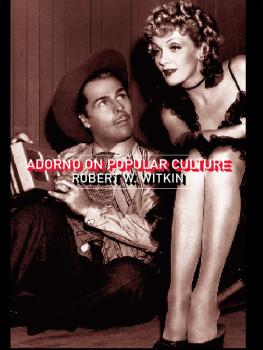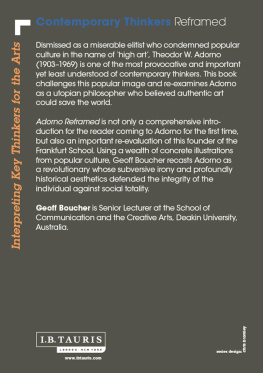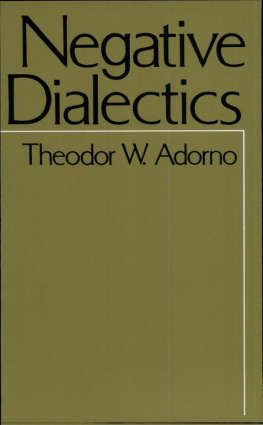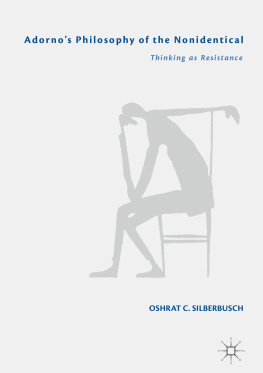Adorno Theodor W. - Introduction to Sociology
Here you can read online Adorno Theodor W. - Introduction to Sociology full text of the book (entire story) in english for free. Download pdf and epub, get meaning, cover and reviews about this ebook. year: 2018, publisher: Polity Press, genre: Politics. Description of the work, (preface) as well as reviews are available. Best literature library LitArk.com created for fans of good reading and offers a wide selection of genres:
Romance novel
Science fiction
Adventure
Detective
Science
History
Home and family
Prose
Art
Politics
Computer
Non-fiction
Religion
Business
Children
Humor
Choose a favorite category and find really read worthwhile books. Enjoy immersion in the world of imagination, feel the emotions of the characters or learn something new for yourself, make an fascinating discovery.
- Book:Introduction to Sociology
- Author:
- Publisher:Polity Press
- Genre:
- Year:2018
- Rating:5 / 5
- Favourites:Add to favourites
- Your mark:
- 100
- 1
- 2
- 3
- 4
- 5
Introduction to Sociology: summary, description and annotation
We offer to read an annotation, description, summary or preface (depends on what the author of the book "Introduction to Sociology" wrote himself). If you haven't found the necessary information about the book — write in the comments, we will try to find it.
Introduction to Sociology — read online for free the complete book (whole text) full work
Below is the text of the book, divided by pages. System saving the place of the last page read, allows you to conveniently read the book "Introduction to Sociology" online for free, without having to search again every time where you left off. Put a bookmark, and you can go to the page where you finished reading at any time.
Font size:
Interval:
Bookmark:

Adornos writings published by Polity Press
The posthumous works
Beethoven: The Philosophy of Music
Introduction to Sociology
Problems of Moral Philosophy
Other works by Adorno
Theodor W. Adorno and Walter Benjamin, The Complete Correspondence 19281940

Copyright this translation Polity Press 2000
First published in Germany as Einleitung in die Soziologie
Suhrkamp Verlag 1993.
First published in 2000 by Polity Press in association with Blackwell Publishers Ltd.
Published with the assistance of Inter Nationes.
Editorial office:
Polity Press
65 Bridge Street
Cambridge CB2 1UR, UK
Marketing and production:
Blackwell Publishers Ltd
108 Cowley Road
Oxford OX4 1JF, UK
All rights reserved. Except for the quotation of short passages for the purposes of criticism and review, no part of this publication may be reproduced, stored in a retrieval system, or transmitted, in any form or by any means, electronic, mechanical, photocopying, recording or otherwise, without the prior permission of the publisher.
Except in the United States of America, this book is sold subject to the condition that it shall not, by way of trade or otherwise, be lent, re-sold, hired out, or otherwise circulated without the publishers prior consent in any form of binding or cover other than that in which it is published and without a similar condition including this condition being imposed on the subsequent purchaser.
ISBN 978-0-7456-2971-1
A catalogue record for this book is available from the British Library.
CONTENTS
When Adorno approved the publication of a series of extempore lectures in 1962, he qualified his approval by commenting that
in his kind of work the spoken and written words probably diverged more widely than was commonplace today. Were he to speak as he was obliged by the dictates of objective discourse to write, he would remain incomprehensible. But nothing spoken by him could meet the demands he placed on a text. [] In the widespread tendency to record and disseminate extempore speeches, he saw a symptom of the behaviour of the administered world, which was now pinning down the ephemeral word, the truth of which lay in its very transience, and holding the speaker to it under oath. The tape recording is like the fingerprint of the living mind.
These words apply even more to the present publication of the last academic lectures given by Adorno, in 1968, the year before his death. They are also the only lectures by him of which a tape recording has survived. This edition therefore goes a step further than Adorno himself did when he occasionally published improvised lectures in slightly revised form. By transcribing the tape recording literally as far as possible this edition attempts to convey what otherwise would have been irretrievably lost: a living impression of Adornos lectures, however inadequately it may be reflected in print. Readers should not forget for a moment that they are reading not a text by Adorno, but a transcript of a talk the truth of which lay in its very transience.
The approach adopted in the English translation is explained in the Translators Afterword.
Ladies and Gentlemen,
Perhaps I may be excused for being, quite simply, delighted to see you present in such numbers at this introductory lecture. It would be disingenuous of me to conceal it either from you or from myself. And I appreciate the confidence you show in me by being here, especially in view of certain voices which have been raised in the press of late, which, I am sure, have come to your notice as much as to mine. On the other hand I feel obliged, just because [Shout from the audience: Speak up!] Well now isnt the loudspeaker working? On the other hand I feel obliged, just because there are so many of you, to say a few words about the career prospects for students of sociology.
At the conference of the Deutsche Gesellschaft fr Soziologie Let me give you a few figures: in 1955 there were 30 sociology majors, in 1959, 163; in 1962 there were 331, in 1963, 383; now there are 626. In view of this I should be professionally blinkered indeed if I were to tell you how wonderful it is that so many of you are studying sociology!
If you compare the expectations and wishes of students with the professions they actually later adopt, the results are even worse. For example and this is very interesting only 4 per cent of sociology students originally wanted to work at a university, whereas 28 per cent of graduates have been absorbed into higher education. In other words, the university, which produces sociologists, is also their main consumer, their primary customer. This is a situation which, making somewhat free use of the language of psychoanalytic theory, I have called incestuous [Laughter], In my opinion, this is not a desirable state of affairs. On the other hand, only 4 per cent of students (Ill only give you a few figures, so that we dont spend too long on these matters) originally intended to go into market and opinion research, whereas 16 per cent have actually entered that profession. By contrast, a relatively high number 17 per cent wanted to work in journalism, radio and television, but only 5 per cent of graduates have found employment there. With regard to industrial and company sociology, 3 per cent wanted to adopt this profession and 4 per cent have actually taken it up a somewhat better ratio.
I wont trouble you further with these findings, but they do show you the broad picture. Herr von Friedeburgsociology is deeply bound up with the object of sociological knowledge or, as I would rather put it of social knowledge. Nor should you blame us, as sociologists, for being unable to reconcile these two incompatible factors. The inhomogeneous nature of sociology is something you will have to come to terms with from the outset. And you will have to try consciously, not with a clouded vision unable to distinguish between what lies on either side of the dividing line to acquire both the sociological skills and knowledge you need for your livelihood, and, at the same time, the insights for the sake of which, I suspect, most of you have decided to study sociology.
I know that one of the complaints which many of you at least, I assume many of you were present on that occasion made against the Deutsche Gesellschaft fr Soziologie, for whose policies I am no longer responsible [Applause], was that it had failed to provide you with study guidance or a proper syllabus. Let me just say here without wanting to minimize any omissions which may have occurred, for I am, heaven knows, no apologist for that learned body that up to a point the discipline itself is responsible for those omissions. It is responsible in the sense that a continuity of the kind which is possible in, lets say, medicine or the mathematical natural sciences, or even, to an extent, in jurisprudence, is not possible in sociology. It cannot be promised, nor should it be expected.
So if you expect me, in these lectures, to explain how you can best plan your course of study, I am not quite equal to the task. At this university we have taken some care to ensure that you will find out about the things which are tested in the sociology exam, or at least hear something about them. But there is no royal road in sociology which would enable you to be told what are, first of all, the subject matter of sociology, then its main fields, then its methods. Or at least my own position, that I neither can nor wish to suppress, is that sociology really cannot be carried on in that way. I am sure it is a good thing, if you want to study sociology, to start by going to an introductory lecture and, at the same time, to attend some specialized lectures on empirical techniques or special fields which interest you particularly. But I believe that you will need to find your own way into this somewhat diffuse entity called sociology. I hope you will forgive me if I also say that if one takes seriously the idea of freedom, which in the academic sphere means academic freedom, or the free choice of study which I believe you take just as seriously as I do then this idea also applies, to some extent, to the way students compile their courses of study. If we were to draw up a precise syllabus for this discipline and oblige you to study according to it, that would certainly make some things easier. It would put those of you who are primarily interested in exams and I dont think less of you for that in a position to reach your goal with a greater degree of certainty than probably is possible under present conditions. But, on the other hand, it would bring a degree of schooling, of standardization, into this new and still relatively free subject free because of its newness and I think that would run exactly counter to what you are hoping to gain from your studies.
Next pageFont size:
Interval:
Bookmark:
Similar books «Introduction to Sociology»
Look at similar books to Introduction to Sociology. We have selected literature similar in name and meaning in the hope of providing readers with more options to find new, interesting, not yet read works.
Discussion, reviews of the book Introduction to Sociology and just readers' own opinions. Leave your comments, write what you think about the work, its meaning or the main characters. Specify what exactly you liked and what you didn't like, and why you think so.














